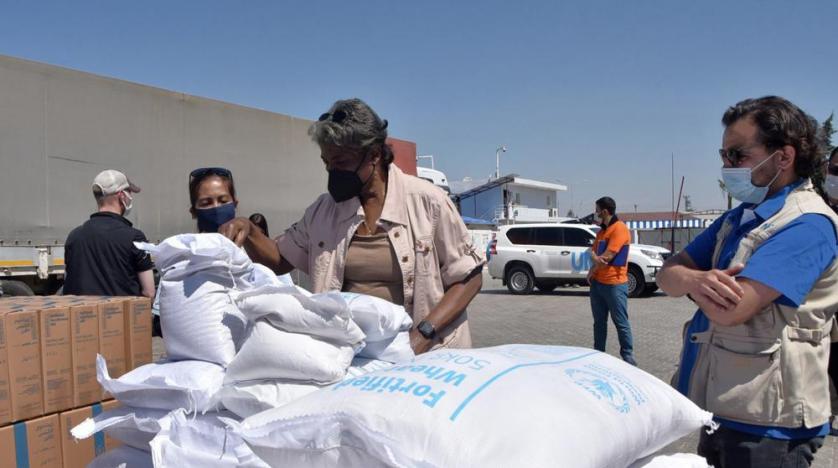The U.S and its allies have presented a series of concessions to Russia in the hope of persuading it to vote in favor of extending the international resolution on cross-border aid to Syria. The final word on whether Moscow will accept the concession ultimately lies in the hands of Russian President Vladimir Putin.
With the arrival of Joe Biden to the White House, Washington has “lowered” the level of its goals in Syria and narrowed them down to the “expansion and extension” of the cross-border aid resolution, which expires on Saturday, completely defeating ISIS and preventing its resurgence, and achieving a comprehensive ceasefire in the hope that factors on the ground would allow the launch of a peace process under the UN Security Council resolution 2254.
These goals were expressed by U.S Secretary of State Antony Blinken during his talks with his counterparts from the G7 and small groups on Syria, with Turkish, Arab, and European officials during closed-door meetings in Rome on June 28th.
The U.S has been making a marked diplomatic push in Syria, first when Blinken chaired a Security Council meeting in March and when the U.S ambassador to the UN Linda Thomas-Greenfield visited the Syrian-Turkish border in June. Moreover, Biden informed Putin during their summit in Geneva last month that extending the cross-border resolution was a “vital issue”.
Read Also: UN Draft Resolution Calls for Syrian Aid Through Two Crossings
The message is clear: The extension of the resolution is a priority for the Biden administration. It wants aid to continue to flow through the Bab al-Hawa crossing in Idleb and wants to reopen the Bab al-Salam crossing between Turkey and the Euphrates Shield Operation areas in Syria and the al-Yaarubiyah crossing between Iraq and regions east of the Euphrates River in Syria that are held by US-backed Kurdish forces.
Biden believes that Putin’s position on cross-border aid will determine the future of bilateral contacts over Syria. Western diplomats and officials believe that Saturday’s vote will serve as an “American test” to Russia.
Aid through Damascus
On the other end of the divide, Russia has rallied its allies behind one stance: No to the extension of the resolution. Moscow is demanding that aid be provided through Damascus and the Syrian government. Aid must also be discussed as part of broader issues, such as lifting western sanctions on the regime, reconstructing Syria, and normalizing relations with Damascus. Moscow has hinted that ultimately, the Kremlin has the final say over the extension of the resolution that will in turn impact the course of ties with the U.S and affect other international issues.
Washington’s European allies want to extend the resolution, but they are also keen on providing support to Syrians inside their country and in neighboring states to dissuade them from migrating to Europe. The migration and terrorism files have come to the forefront in Europe with the rise of right-wing governments. Moreover, offering aid to Syrians has been welcomed by civil society and leftist groups in Europe, with donations reaching some 25 billion euros in ten years.
The U.S opposed a resolution by its allies, Ireland and Norway, that called for the opening of two border crossings instead of the three Washington wanted. Meanwhile, Moscow is sticking to its guns and adamant about seeing all the crossings closed. On Wednesday, Ireland and Norway again submitted another draft resolution that calls for the reopening of the al-Yaarubiyah crossing and extending the deal on Bab al-Hawa. The Russian delegation promptly withdrew from the meeting tackling the draft as a sign of its opposition.
Read Also: Mekdad Hails Resolution on Extending Entry of Humanitarian Aid
The western powers and the U.S met this withdrawal by offering another concession: removing the al-Yaarubiyah crossing from the draft hoping to convince Russia to extend the resolution.
Before this week’s talks, Washington had provided incentives to Moscow in return for agreeing to the extension. They included agreeing on providing aid that would secure the “perseverance” and “early recovery” of Syrians and delivering aid through the “contact lines” that border the three main Syrian zones of influence. Other incentives include preventing the resurgence of extremist groups such as ISIS and its ilk.
Moscow, meanwhile, is continuing to escalate its stances during the negotiations on the resolution extension. It even brought in Ankara and Tehran to back its position during a meeting on Friday of the Astana guarantors.
A closing statement by the three parties did not address the cross-border aid, but it rather stressed the need to deliver relief to all Syrians throughout the country without exception or preconditions. They called on the international community, UN, and its humanitarian agencies to bolster aid to Syria through developing early recovery and rebuilding vital infrastructures, such as water pipelines, power lines, schools, and hospitals, and the removal of landmines.
Moscow has yet to give the “green light” to these western offers. It has notably, yet to use its veto against the draft resolution. Western powers are hoping that Putin will not shut the door against Biden early on in his term and that his agreement to extend the resolution would keep the door open for future negotiations between the White House and Kremlin on other issues.
This article was edited by The Syrian Observer. The Syrian Observer has not verified the content of this story. Responsibility for the information and views set out in this article lies entirely with the author.


